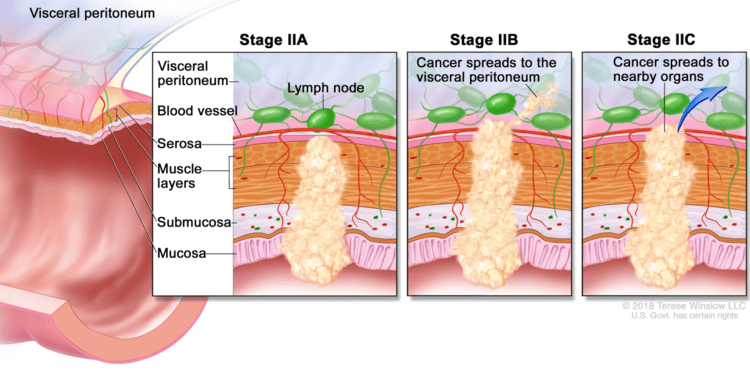Stage 2 Rectal Cancer ICD 10 is C20.
Tap “Watch Now” for an easy-to-understand overview of Stage 2 Rectal Cancer.
- Stage 2A Rectal Cancer
- Stage 2B Rectal Cancer
- Stage 2C Rectal Cancer
Overview
Stage 2A Rectal Cancer, is when the tumor has spread to the outermost layer of your rectum called the serosa, shown as a dark pink band.
Shown here in yellow, you can see the cancer is in the rectum but it has not affected the closest lymph nodes or other organs in your body.
What Tests Will I Need and Why?
A Rectosigmoidoscopy (a thin tube with a camera that is introduced through your anus to see the inside of your colon) is usually the first step to identify the tumor inside your colon and take samples for analysis.
Blood and Imaging tests are done to understand your general health, confirm your diagnosis and determine your cancer stage.
Tissue analysis is also typically done through a biopsy to identify the cancer cell type, which is critical to finding the best treatment option for you.
If your treatment team has not already performed tests to determine your cancer’s features, please ask your doctor when these tests will be performed.
Re-read this summary as needed and then tap, “Compare My Treatment Options Now“. Our unique Comparison Page will help you understand your FDA-approved treatment options including, who can help you pay for your treatment, where and how each is given and what side-effects you may experience.

National Institute of Health/ treatment-rectal
Overview
Stage 2B Rectal Cancer diagnosis is when the cancer has spread through the serosa to the tissue that covers most of the organs in your abdomen call the peritoneum.
As you can see here, while more spread has occurred than in Stage 2A, the Rectal Cancer has still not spread to any other organs.
What Tests Will I Need and Why?
A Rectosigmoidoscopy (a thin tube with a camera that is introduced through your anus to see the inside of your colon) is usually the first step to identify the tumor inside your colon and take samples for analysis.
Blood and Imaging tests are done to understand your general health, confirm your diagnosis and determine your cancer stage.
Tissue analysis is also typically done through a biopsy to identify the cancer cell type, which is critical to finding the best treatment option for you.
If your treatment team has not already performed tests to determine your cancer’s features, please ask your doctor when these tests will be performed.
Re-read this summary as needed and then tap, “Compare My Treatment Options Now“. Our unique Comparison Page will help you understand your FDA-approved treatment options including, who can help you pay for your treatment, where and how each is given and what side-effects you may experience.

National Institute of Health/ treatment-rectal
Overview
A Stage 2C Rectal Cancer diagnosis means that the cancer has spread to nearby organs like the prostate, seminal vesicles, cervix or vagina.
What Tests Will I Need and Why?
A Rectosigmoidoscopy (a thin tube with a camera that is introduced through your anus to see the inside of your colon) is usually the first step to identify the tumor inside your colon and take samples for analysis.
Blood and Imaging tests are done to understand your general health, confirm your diagnosis and determine your cancer stage.
Tissue analysis is also typically done through a biopsy to identify the cancer cell type, which is critical to finding the best treatment option for you.
If your treatment team has not already performed tests to determine your cancer’s features, please ask your doctor when these tests will be performed.
Re-read this summary as needed and then tap, “Compare My Treatment Options Now“. Our unique Comparison Page will help you understand your FDA-approved treatment options including, who can help you pay for your treatment, where and how each is given and what side-effects you may experience.

National Institute of Health/ treatment-rectal
Recommended Rectal Cancer Videos

Colorectal Cancer
Overview and Introduction

How Cancer Spreads
Metastatic = Advanced

Diagnosing Your Cancer
How Does a CT Scan Work?

Diagnosing Your Cancer
How Does a PET Scan Work?

Exercise! You Can Do It
Reducing Side Effects & More
Commonly Searched Questions
Stage 2 Rectal Cancer Definition
Source: Cancer.gov
Stage 2 Rectal Cancer Survival Rate
Source: Cancer.org
Stage 2 Rectal Cancer Treatment
Stage 2 rectal cancer is treated with surgery and lymph node removal.
Stage 2 Rectal Cancer Symptoms
- constipation
- diarrhea
- changes in stool color
- changes in stool shape, such as narrowed stool
- blood in the stool
- bleeding from the rectum
- excessive gas
- abdominal cramps
- abdominal pain
Source: Healthline.com
Stage 2 Rectal Cancer Recurrence Rate
Source: Cancer.org
Stage 2 Rectal Cancer Prevention
- Healthy Diet: Focus on a diet high in fruits, vegetables, whole grains, and legumes, while limiting red and processed meats.
- Maintain a Healthy Weight: Achieve and maintain a healthy weight through a balanced diet and regular physical activity.
- Regular Screenings: Follow recommended screening guidelines, especially if you are at higher risk due to family history or other factors. Early detection can help manage or prevent the progression of cancer.
- Avoid Smoking: Do not smoke and avoid exposure to tobacco smoke.
- Limit Alcohol Intake: Consume alcohol in moderation or not at all.
Source: Cancer.org













